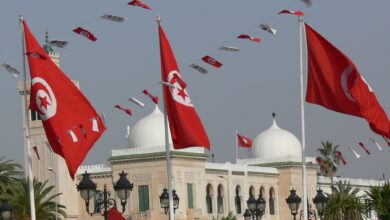The Egyptian pound stabilized on Tuesday as the central bank apparently acted to support it, after the currency fell to near a six-year low on Monday in response to the political turmoil in Tunisia, traders said.
In the spot market, the pound strengthened marginally to close at 5.8220 against the dollar from Monday's finish of 5.8240. At the end of last week, the Egyptian currency was trading around 5.8000.
Currency traders said that with Egyptian share prices declining, it was almost certain that the central bank was selling dollars to support the currency after Monday's decline.
Dealers say the central rarely intervenes directly, but often buys and sells the currency indirectly by way of one or two local banks.
"On a day like today where the stock market went down 3.14 percent you would have totally seen an outflow, and the currency appreciated, so it's clear the central bank intervened selling dollars," said one dealer.
Tuesday's decline in Egypt's benchmark stock index .EGX30 was the biggest in eight months and followed a 2.4 percent slide on Monday, as investors worried that Tunisia's political instability might eventually spread to Egypt or other countries in North Africa.
Economists said the central bank was likely to use its unofficial reserves to ensure that any weakening of the pound was gradual, so that Egyptian depositors did not take fright and shift large amounts of their cash into dollars.
Barclays Capital estimated foreign holdings of Egyptian assets were close to US$25 billion, with roughly half held in Treasury bills and bonds. The high foreign exposure poses a significant potential risk to the currency, Barclays said.
In a research note recommending that investors reduce their Egyptian pound exposure, Barclays said it expected the currency to weaken over coming months, reaching 6.00 in a year's time.
Barclays cited increased political risk, the poor performance of currency trades into the pound last year, the central bank's focus on stimulating economic growth and competiveness, which could cause it to oppose any strength of the currency, and Egypt's deteriorating fiscal outlook.
However, it added that it was reluctant to go short on the Egyptian pound because of high interest rates in Egypt and the central bank's determination to limit the currency's volatility.
Trade in the non-deliverable forwards market, where the Egyptian pound is traded for delivery on a future date, has slowed since Tunisia's president was ousted because of a feeling of increased risk, and deals taking place indicate the currency will weaken in coming months, traders said.
On Monday, the first working day since President Zine al-Abidine fled Tunis, trade in the offshore NDF market dried up entirely. Trades on Tuesday were worth about $30-40 million, compared to daily levels of around $50 million before the Tunisian crisis erupted, said a dealer based outside Egypt.
"There were some offers today," he said. "There were some clients trying to take advantage of the high implied yields on the NDFs, betting that there won't be a problem. But in general the market is much better bid," indicating pressure for the Egyptian pound to depreciate.
A one-month NDF, for delivery of Egyptian pounds in one month's time, traded at 5.90 to the dollar on Tuesday, the trader said.




